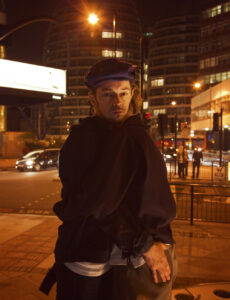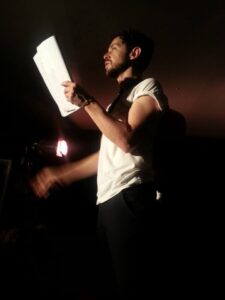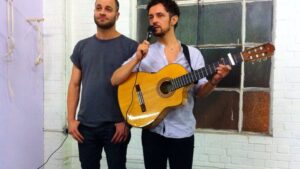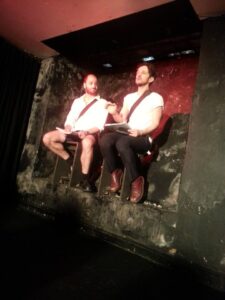Just for now – interview with Greek poet and musician Sitron Panopoulos
posted January 8, 2014 at 4:10 pm in Feature, Interviews, Music, PoetryPOETRY is a much abused and misunderstood medium. And it is a matter of some sadness, to me at least, that the stagnant pond that passes for London’s poetry scene is in the main filled with soi-disant poets who labour under the misapprehension that conjuring up a few rhyming couplets makes one a poet. So I was intrigued to attend the launch of the first collection by the London-based Greek poet and musician Sitron Panopoulos, In These Great Democracies, which rather than the staid environs of most poetry venues took place in a (once illegal) basement nightclub. Beautifully illustrated and produced, In These Great Democracies, traces the poetics of the everyday, of love and loss, the transience and drift of a mood.
Can you tell me something about your background?
I came from Greece to London when I was 17 to study film, and then couldn’t be bothered to make films. Instead I started playing in bands.

Which bands?
Bands you wouldn’t know of. My first band was called Chips. It was a punk rock band and a university band. Then we started hanging out in central London.When was this?The summer of ’98. I was kind of like 17, 18 and London was booming and the potential was endless so I packed up films to do music because it was just so immediate and sexy.
I was involved in music for quite a few years and then in fashion. The designer, Kostas Murkudis, who I had worked for, asked me to write a poem for his book on tartan which I did. Then other people asked me to write pieces and following this, I was asked to record, to put a collection of songs together. I was always scribbling and this book came as I was scribbling a lot. It was a time where I was trying to stop partying so much.

When did you decide to stop?
In 2008. And when you stop partying, you just have loads of uncharted thoughts going through your head. When you stop drinking, you have loads of energy and so I started writing more and more. Friends would come and visit me and they would see pieces of writing lying around. I never set out to be a poet. So you just did this for yourself because you thought you had to do it? And also I’d stopped drinking and I started sleeping with people – having lots of casual sex.
Usually you have the drink and the casual sex but here they are separate?
No, no! Because when I was drinking, I didn’t care about having casual sex because I was drunk. So I stopped drinking, and I was looking for the connection in other people. Loads of the stuff that I was writing was about the problems with casual sex – the moment of separation the day after and the sadness that comes from the separation.
I had this idea of writing something about living in the East End of London and sleeping with people in my community and the feelings that come afterwards. It was about community, community connections, the febrility of connections. It was a diary of one-night stands.
 Sitron and Victor Esses performing Co=dependently Yours at Deptford X Festival
Sitron and Victor Esses performing Co=dependently Yours at Deptford X FestivalHow long did it take to get the book out? I love the production. It’s very beautiful.
The book took about two years to write and about another year to produce. My friend Sarah John started making images for the book and then something weird happened. She would make images based on the poems and those images would generate other poems. So the book took about three years, letting it sit and then starting again. It’s my first time and I’m not a fast worker. I’m a perfectionist and I like revisiting stuff.
Do you have any plans to write more?
Yes I want to write, I’ve started writing shorter pieces inspired by the whole blogging and twitter social media thing, the economy of words you need to have in order to communicate in those mediums. I’m inspired by how you can put poetry with economy of words, combine poetry and economy of words and how you can create images and thoughts with those two things together and that is something I’m working on.
And also a project about how I see people around me so kind of like, my friends, the London celebrities, the East End celebrities. The celebrities that not many people know about. So it’s a book about celebrities that only a few people know. And my insight into them so it’s a bit funnier.
And you’ve been reading in different cafes and bars. I saw your performance at Vogue Fabrics. When did you do Dalston Superstore?
It was really nice actually because it was to a fashion crowd and with kids, with the designer Alun Davis. Poetry can be so archaic so it was kind of like really nice to perform on the bar of Dalston Superstore for the fashion kids. But I think poetry should come out of the elitist literary salons. You know that is my most hated thing! I got booked to play recently at a poetry event and it was all jokey. I felt I was in melancholia fucking paradise. My stuff just really does not fit with those guys. I felt really bad actually. I hate the jokey, blokey thing.

I just write love songs and sing them. I play guitar and a bit of piano. But on stage I play guitar. I haven’t played for three or four years, though as I’ve been doing this. I can’t multi-task. So now that the poetry thing is complete and the book has come out, now I am back onto creating music.
Did you use to play with [Leigh Bowery’s band] Minty?
I wasn’t part of Minty but I’ve done a couple of shows with people who were members of Minty, such as Matthew Glamorre. And I also used to play with Patrick Wolf.
What did you do with Patrick Wolf?
Matthew from Minty had this project called Sound Storm and Patrick, myself and Bishi were kind of like the vocalists. We would have our own songs and we wrote different songs with each other and with Matthew and sing them. This was before the East End was happening though. I’ve seen friends playing recently and I’ve been yearning to use my voice in a combination with notes not just rhymes.
Have you had a good response to your book?
People have been really supportive, it sold well on the night of the launch, people asked me to play gigs, somebody asked Kate [who works with Sitron] to enter my poems into some competitions, and I’ve just put a poem up at the cafe in Dalston, Tina We Salute You on their curated wall.
When you take poetry into clubs in your way, what do you /think it brings to that venue or that experience?
I really like the idea of poets in clubs and poetry on walls and the communication of that because, to me, what poetry does, is to give you a new pair of eyes. It enables me to look at everyday situations with a more grateful, romantic eye. It makes me appreciate the moment.
So putting that stuff up there on walls, and in clubs, places that people don’t really expect it, is offering a new thought and a new way of looking at things to people. Art shouldn’t only be in a gallery, it should be out there in the streets. That’s where its social call is. It’s just a new perspective, a new pair of eyes, you know, new emotions. You know hope, hope.
–––––
Sitron has recently been developing a poetry and music-based theatrical piece, in collaboration with stage director, Victor Esses with the working title Co-dependently Yours. As part of its development, as it is still work in progress, it has been performed at the 184 Studios in Lambeth. It had a two night run at Vogue Fabrics and was performed at the closing night of the Deptford X Art Festival in September. Sitron is in discussion with various theatres regarding performing it in early Summer 2014.
His most up-and-coming project, about to be released in very early 2014 is his first music EP called London. It is a continuation of his poetry book In These Great Democracies and is a collection of five songs about London and otherness, produced by Martin Bjork, Owe Doll and Tris Penna. Sitron describes it as a token of gratitude to the city that has become his home over the last decade.
by Caroline Simpson
Here is an exclusive preview of the video of Coco Chanel, one of the songs on the EP Coco Chanel by Sitron Coco Chanel
New work by Sitron:
In These Great Democracies is available now.
Published on January 8, 2014